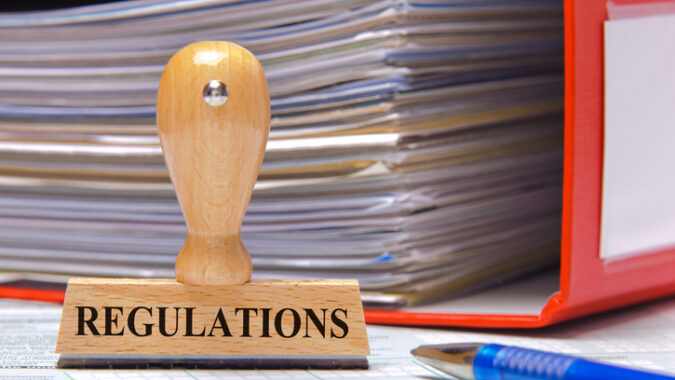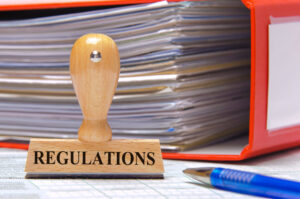The NJ Department of Labor and Workforce Development (LWD) has released proposed regulations implementing the paid sick leave law, which takes effect on Oct. 29.
Employers have been waiting for clarification on a number of issues. While NJBIA has not had a chance to fully analyze the regulations, here are a couple of highlights.
See Mike Wallace’s Issue Network for the complete regulations and how to comment.
Join us Sept. 28 for A Crash Course in New Jersey’s Paid Sick & Family Leave Laws.
Accrual of benefits.
The law requires that employees accrue sick leave at the rate of one hour of leave for every 30 hours worked. One of the questions for employers is how to calculate accrued leave for workers who are not paid hourly.
The regulations state:
“12:69-3.3
…(c) Where the employer does not record hours worked for a particular employee because the employee is an exempt employee under either the Federal Fair Labor Standards Act, 29 U.S.C. §§ 201 et seq., or the New Jersey Wage and Hour Law, N.J.S.A. 34:11-56a et seq., the employer may either:
1. Record the actual hours worked for that employee for the purpose of calculating earned sick leave accrual; or
2. Presume, solely for the purpose of calculating earned sick leave accrual, that the employee works 40 hours per week.
(d) For an employee who commences employment on or before October 29, 2018, earned sick leave shall begin to accrue no later than October 29, 2018.”
Calculating the Rate of Sick Leave Pay
Employers are required to pay sick leave at the same rate of pay as an employee’s regular salary or wages. The regulations explain how to calculate the rate of pay for employees paid on commission, paid piecework, or paid at different rates during the year.
The regulations state:
“12:69-3.6
…(d) Where an employee has two or more different jobs for the same employer or if an employee’s rate of pay fluctuates for the same job, the rate of pay for earned sick leave shall be the amount that the employee is regularly paid for each hour of work as determined by adding together the employee’s total earnings, exclusive of overtime premium pay, for the seven most recent workdays when the employee did not take leave and dividing that sum by the total hours of work during that seven-day period.
(e) Where an employee is paid by commission, whether base wage plus commission or commission only, the employer must pay the employee during earned sick leave an hourly rate that is the base wage or the State minimum wage rate, whichever is greater.
(f) When an employee is paid on a piecework basis, whether base wage plus piecework or piecework only, to calculate the employee’s rate of pay for earned sick leave, the employer shall add together the employee’s total earnings for the seven most recent workdays when the employee did not take leave and divide that sum by the number of hours the employee spent performing the work during workdays.”
Limiting Use of Sick Leave
When sick leave is foreseeable, employers can require employees to provide notice ahead of time, and can restrict use during certain busy times of the year. The regulations state:
“N.J.A.C. 12:69-3.4.
…(f) Where the employee’s need to use earned sick leave is foreseeable, the employer may require advance notice, not to exceed seven calendar days prior to the date the leave is to begin, of the employee’s intention to use the leave and its expected duration.
1. For purposes of this subsection, the need to use earned sick leave shall be considered “foreseeable,” when the employee is able to predict or know in advance that he or she will need to use earned sick leave, such as a scheduled doctor’s visit, a regularly occurring medical treatment, or regularly scheduled therapy appointment.
(g) Where the employee’s need to use earned sick leave is foreseeable, the employee shall make a reasonable effort to schedule the use of earned sick leave in a manner that does not unduly disrupt the operations of the employer.
1. For purposes of this subsection, the need to use earned sick leave shall be considered “foreseeable,” when the employee is able to predict or know in advance that he or she will need to use earned sick leave, such as a scheduled doctor’s visit, a regularly occurring medical treatment, or regularly scheduled therapy appointment.
(h) Where the employee’s need to use earned sick leave is foreseeable, the employer may prohibit the employee from using earned sick leave on certain dates.
1. For purposes of this subsection, the need to use earned sick leave shall be considered “foreseeable,” when the employee is able to predict or know in advance that he or she will need to use earned sick leave, such as a scheduled doctor’s visit, a regularly occurring medical treatment, or regularly scheduled therapy appointment.
2. The “certain dates” on which the employer may prohibit employees from using foreseeable earned sick leave shall be limited to verifiable high-volume periods or special events, during which permitting the use of foreseeable earned sick leave would unduly disrupt the operations of the employer.
3. An example of a high-volume period would be, for an airline industry employer, the period during which they experience a predictable increase in customer activity (which is to say, flying) in and around a particular holiday, like Thanksgiving.
4. An example of a special event would be, for a manufacturer of retail products, the day or week during which it is making a new product available for the first time (that is, a product launch).
5. The employer shall provide reasonable notice to its employees of those “certain dates” on which its employees are prohibited from using foreseeable earned sick leave. (i) Where the employee’s need to use earned sick leave is not foreseeable, the employer may require an employee to provide notice as soon as practicable, of the employee’s intention to use the leave and its expected duration.”


